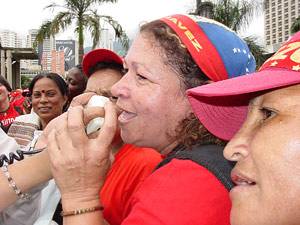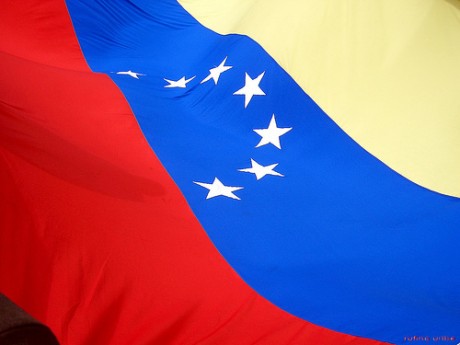Report Back from Venezuela – A 21st Century Revolution
 international |
anti-capitalism |
feature
international |
anti-capitalism |
feature  Monday October 09, 2006 15:09
Monday October 09, 2006 15:09 by Nina López and Maggie Ronayne, Global Women’s Strike
by Nina López and Maggie Ronayne, Global Women’s Strike Ireland at allwomencount dot net
Ireland at allwomencount dot net 087 7838688
087 7838688
An edited version of this article will shortly be published in the Winter edition of Island magazine.
In January of this year we were part of an eight-country Global Women’s Strike delegation to Venezuela from co-ordinating groups in England, Guyana, India, Ireland, Peru, Spain, Uganda, and US – over 70 women and men. Working with the Bolivarian revolution since 2002, our global network took advantage of Caracas hosting the World Social Forum to work together in the heart of the revolution. We wanted as many of us as possible to witness how grassroots communities, beginning with women, are spearheading a revolution and winning back their oil wealth, through an extraordinary relationship with their elected President Hugo Chávez Frías.
For decades successive ‘democratic’ governments helped the US-backed mainly white elite collaborate with multi-national corporations to steal that wealth, while the Indigenous, Black and mixed race majority lived in poverty.
President Chávez has said ‘to end poverty we must give power to the poor.’ Social programmes (called missions), based on grassroots self-activity which bypasses corrupt state institutions, are funded by Venezuela’s oil revenue. This revenue is being made available to those with least throughout Latin America and the Caribbean. Even in the US, CITGO, Venezuela’s oil company there is providing heating oil to low-income communities, such as the victims of Katrina, at a 40% discount. On his visit to Europe in May, President Chávez offered the same to those of us who are poor here.
Our visit began with participation in the World Social Forum – an opportunity to meet grassroots organisers from around the world. We organised a number of workshops in English and Spanish, which gave visibility to the Strike’s campaigns and struggles: from Dalit and Tribal women in India defeating bonded labour and bringing rapist landlords to justice, to Peruvian domestic workers winning protective legislation, rural Ugandan women demanding water, and Afro-, Indo- and Indigenous Guyanese and US survivors of Katrina, both fighting for compensation in the toxic aftermath of flooding.
Our most popular workshop, ‘Grassroots self-activity in the Bolivarian Revolution’, featured our Venezuelan network as well as two speakers from Haiti who described the resistance to the US-UN occupation. As Bolivar Ramilus, Commissioner of Peasant Affairs under President Jean-Bertrand Aristide, has said: ‘The revolution in Haiti is like Venezuela, but without its leader.’
At a key Indigenous workshop where people from different nations proposed coming together across national borders, we met a Mexican woman who, though we didn’t know, has been co-ordinating Strike actions for years. We were thrilled! She spent the rest of the time with us.
We expected a more vibrant Forum, full of the movement that is sweeping Latin America and the Caribbean. In fact this movement was everywhere else in Venezuela. It filled the streets with two million people in red t-shirts on 4 February, anniversary of President Chávez’s first attempt to overturn Venezuela’s corrupt ‘democracy’. We also met activists from disability organisations and the Venezuela Gay Revolutionary Movement. Their t-shirts read: ‘Revolution and homosexuality, no contradiction’ with a Chavez quote in support of gay rights.
And we launched our latest book, Creating a Caring Economy: Nora Castañeda and the Women’s Development Bank of Venezuela, as a way of spreading the word about how women are organising and what they are achieving. The launch was deeply moving as crowds gathered at the Central University in Caracas to honour Nora, for 30 years a much loved and respected professor.
It was after the Forum that we learnt most. The Grassroots Network of Los Altos Mirandinos and the Users’ Network of the Women’s Development Bank (Banmujer) took us to meet their people in Los Teques, Tarmas and Estado Bolivar, mainly women who as society’s main carers are most concerned with the community’s health and welfare. They run the missions. That is, they run water, health, housing and education committees and soup kitchens, to get water supplies, food security, housing, free health care and education for people of all ages, and free school meals. They run the land committees organising for millions of rural and urban people who built homes on squatted land, to get land rights, including the re-distribution of idle land. They monitor local authorities to stop corruption. Many have formed co-operatives, with Banmujer’s help getting subsidised credit for income-generating projects that benefit the whole community.
We visited several neighbourhoods in Los Teques. The co-ordinator and the midwife who works with her told us how they run their food programme. They feed children and their adult carers, and co-ordinate with the other missions so that people’s health, educational and other needs are addressed together.
At El Nacional and San Pedro health clinics we met the doctors and the unpaid nurses and housewives who run the health committee to whom the doctors are accountable. These volunteers pay home visits, assess needs and inform the neighbourhood of their rights. Patients organise themselves in groups according to symptoms – diabetics, heart patients, asthmatics…– so they can share their experience of treatment, and work on prevention. Alternative treatment is integral to healthcare – herbal, homeopathy and most importantly “laughter therapy” which boosts the immune system’s ability to fight.
In La Pradera, thanks to the land committee, people whose housing is unsafe are being rehoused while others are forming co-operatives for tourism to enhance the area’s viability.
Everyone was welcoming, eager to share their achievements and to know what we thought about their Bolivarian process. They were confident and enthusiastic in their support for President Chávez, whose approval rating has risen to 77%.
Chávez has repeatedly said that women are the poorest and work hardest. On 3rd February we were there for his announcement that the poorest housewives, mostly single mothers, are to receive a monthly payment equivalent to 80% of the minimum wage, about $180 per month. Up to 500,000 women will eventually get this wage. This measure is inspired by Article 88 of the Venezuelan Constitution, which recognises the economic and social contribution of women’s work in the home. While this Article remains to be implemented, President Chávez put the recognition Article 88 gives to unwaged work, together with an anti-poverty law that was going through parliament, to get some money to women. This recognition of caring work is a great victory for women everywhere.
While we were there, our hostesses in Los Altos Mirandinos wrote an extraordinary letter to Chávez celebrating this new wage and stating that ‘revolutionary community work must also be recognised as productive work that should be remunerated. It is not right that we the women who, as our President has said, are the foundation of the revolution, have to depend on the charity of our partners and relatives in order to carry out our revolutionary labour.’ * They suggested how to involve the grassroots in the distribution of this mothers’ money in order to avoid corruption. Chávez, who has been outspoken against corruption, was happy to incorporate them in the Neighbourhood Mothers Mission formed for this distribution.
We also met with some of the oil workers who in 2003 together with the community defeated the US-backed sabotage of their industry. They are aware of the enormous job ahead of them: to root out the corruption and pollution which are the stock in trade of oil multinationals in particular.
Venezuelan state TV is eager to publicise what movements everywhere are doing. It broadcast Refusing to Kill, the powerful documentary made by Payday men’s network (who organise men’s participation in the Strike) about the growing movement of conscientious objectors who refuse to serve in the US, Israeli, Turkish and other armies.
The Strike in Ireland has been working with our colleagues in London to ‘globalise Article 88’. In 2005, we were asked by the parliamentary committee on the Irish Constitution to submit information on Article 88. Using it as a model, we proposed a rewording of Article 41.2 of our Constitution. Instead of removing the recognition it gives to women’s work in the home (as some feminist groups suggested), we proposed to change its sexist language so that our unwaged caring work at home and on the land, and men’s when they do it, would be valued and paid for. And we proposed pay equity as a right for those of us who do the double day so women are no longer forced into the lowest paid jobs.
While the committee adopted ‘gender neutral’ language (thus hiding women’s enormous contribution), the reference to caring and the recognition it stands for remains in their revised Article 41.2. Undoubtedly the Venezuelan example helped achieve this.
The Bolivarian revolution helps us to look again at our history, at the need to keep to our principles and to keep our leaders accountable. As we have been so painfully and movingly reminded by Ken Loach’s film The Wind That Shakes the Barley, in Ireland (like in many other countries) we went through an enormous upheaval to make a revolution which was defeated. The internationalism of the Bolivarian revolution, its socialism for the 21st century which appeals to people everywhere who are fighting to ‘create a caring economy, an economy at the service of human beings’, and its clarity in the face of US genocidal fundamentalism are a beacon of hope for all of us.
The word revolution scares many people. They feel it must inevitably mean guns and bloodshed, partly because sections of the Left have sometimes glorified armed struggle. Many on the Left were sceptical when we began working with Venezuela. How could it be a revolution, they said – it was being fought through elections, was spearheaded not by industrial workers but by the unwaged, especially women and bypassing the political parties. While much of the Left has now ‘adopted’ Venezuela, some promote a ‘Chavismo without Chávez’, jealous of Chávez’s extraordinary popularity. It takes a mass movement over decades to make a leader like Chávez, and most Venezuelans are determined to hold on to him. ‘Ten million for Chávez’ is the slogan we heard over and over from people referring to votes in the upcoming presidential election in December. They are determined to win, especially the women who have gained so much through this revolution.
*********
Juanita Romero and Gaston Murat, points of reference for the Grassroots Network of Los Altos Mirandinos, will be in England, Scotland and Ireland at the beginning of October to launch the Strike’s latest film, Journey with the Revolution.
For more information on Galway and Dublin tour events happening next week on 10th and 11th October see the indymedia events calendar.
* To read the full statement by the grassroots network of Los Altos Mirandinos to President Chavez, see http://www.globalwomenstrike.net

